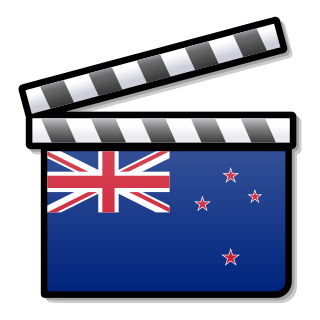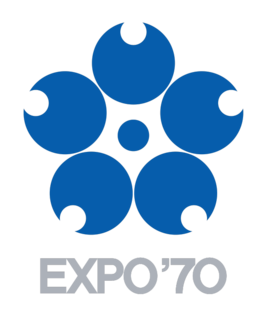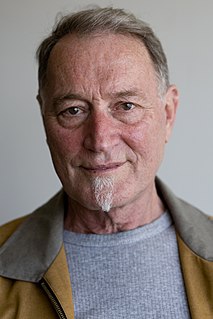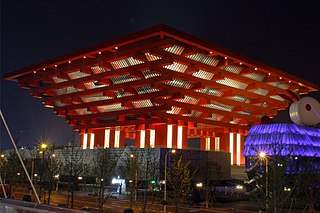Related Research Articles
In film and video production, split screen is the visible division of the screen, traditionally in half, but also in several simultaneous images, rupturing the illusion that the screen's frame is a seamless view of reality, similar to that of the human eye. There may or may not be an explicit borderline. Until the arrival of digital technology, a split screen in films was accomplished by using an optical printer to combine two or more actions filmed separately by copying them onto the same negative, called the composite.

Vincent Ward is a New Zealand film director, screenwriter and artist. His films have received international recognition at both the Academy Awards and the Cannes Film Festival.

New Zealand cinema can refer to films made by New Zealand-based production companies in New Zealand. However, it may also refer to films made about New Zealand by filmmakers from other countries. Due to the comparatively small size of its film industry, New Zealand produces many films that are co-financed by overseas companies.

An Angel at My Table is a 1990 biographical drama film directed by Jane Campion. The film is based on Janet Frame's three autobiographies, To the Is-Land (1982), An Angel at My Table (1984), and The Envoy from Mirror City (1984). The film was very well received. It won awards at the New Zealand Film and Television awards, the Toronto International Film Festival, and second prize at the Venice Film Festival.

Expo '70 was a world's fair held in Suita, Osaka Prefecture, Japan between March 15 and September 13, 1970. Its theme was "Progress and Harmony for Mankind." In Japanese, Expo '70 is often referred to as Ōsaka Banpaku (大阪万博). It was the first world's fair held in Japan.
Hugh MacDonald is a New Zealand film director who made films for the Government National Film Unit for over two decades, before going solo. His work includes many travel films and two episodes of ambitious historical drama The Governor.
Paolo Rotondo is a New Zealand director, writer and actor of stage and screen.

The National Film Unit (NFU) was a state-owned film-production organisation originally based in Miramar, New Zealand. Founded in 1936 when the government took over a private film studio, Filmcraft, the NFU produced newsreels, documentaries and promotional films about New Zealand, and for many years was the only significant film-production facility in the country. Many people who became prominent in the development of the modern New Zealand film industry were trained by the NFU.

Peter Northe Wells was a New Zealand writer, filmmaker, and historian. He was mainly known for his fiction, but also explored his interest in gay and historical themes in a number of expressive drama and documentary films from the 1980s onwards.
Jason Stutter is a New Zealand-based motion picture, television and commercial director.

The China pavilion at Expo 2010 in Pudong, Shanghai, colloquially known as the Oriental Crown, was the largest national pavilion at the Shanghai Expo and the largest display in the history of the World Expo. It was also the most expensive pavilion at the Shanghai Expo, having cost an estimated US$220 million. The pavilion showcased China's civilization and modern achievements by combining traditional and contemporary elements in its architecture, landscaping and exhibits. After the end of the Expo 2010, the building was converted to a museum. On October 1, 2012, it was reopened as the China Art Museum, the largest art museum in Asia.

David Timothy Gibson is the founder of New Zealand film production company The Gibson Group. After its sale in 2013 to his business partners, he was appointed CEO of the New Zealand Film Commission.
Schtung were a New Zealand progressive rock band active from 1976. The band developed out of school-era bands formed by friends keyboardist/vocalist Andrew Hagen and guitarist/vocalist Morton Wilson.

Ainsley Amohaere Gardiner is a film producer from New Zealand. She is of Te Whānau-ā-Apanui, Ngāti Pikiao and Ngāti Awa descent.
Jackie van Beek is a New Zealand film and television director, writer and actress.

Warrick 'Waka' Attewell is a New Zealand cinematographer who over a long career has worked on many notable film and television productions. He joined John O'Shea's Pacific Films early in his career where he worked on Tangata Whenua - the People of the Land (1974), directed by Barry Barclay, and written and presented by Michael King. Independently and through his production company Valhalla Films, Attewell has filmed and directed short films, features, documentary, music video's and commercials. Developing future film makers has been part of Attewell's career, teaching cinematography at various film schools in New Zealand. Attewell has also worked with many well known New Zealand personalities and entertainers including briefly with Billy T James on a commercial. Attewell was director of photography on the documentary about Billy T James called Billy T: Te Movie (2011). Most recently Attewell was cinematographer and concept director on the Undertow (2019) television series screened on Māori Television in New Zealand.
Michelle Scullion is a New Zealand musician and composer. Several of her soundscapes are part of installations at Museum of New Zealand Te Papa Tongarewa.
Vincent Burke was a New Zealand television and film producer. Burke was the founder of Top Shelf Productions which was established in 1988. With a career spanning thirty years, Burke was noted for his documentary work and television productions which addressed social issues and everyday life.
Elizabeth Anne Hakaraia is a New Zealand Māori film producer and director. Her iwi are Ngāti Kapumanawawhiti, Ngāti Raukawa, Ngāti Toa Rangatira and Te Āti Awa.
References
- 1 2 3 4 Screen, NZ On. "This is New Zealand | Short Film | NZ On Screen". www.nzonscreen.com. Retrieved 10 January 2022.
- ↑ Screen, NZ On. "Credits | This is New Zealand | Short Film | NZ On Screen". www.nzonscreen.com. Retrieved 10 January 2022.
- ↑ "Archives New Zealand || This is new zealand". www.archives.govt.nz. Retrieved 10 January 2022.
- ↑ "The World in Miniature: This is New Zealand & South Seas Adventure". The Lumière Reader. 29 April 2014. Retrieved 10 January 2022.
- 1 2 Stuart, Hamish (6 February 2007). "Remastered 70's NZ film wins New York award". The New Zealand Herald . NZPA . Retrieved 22 November 2011.